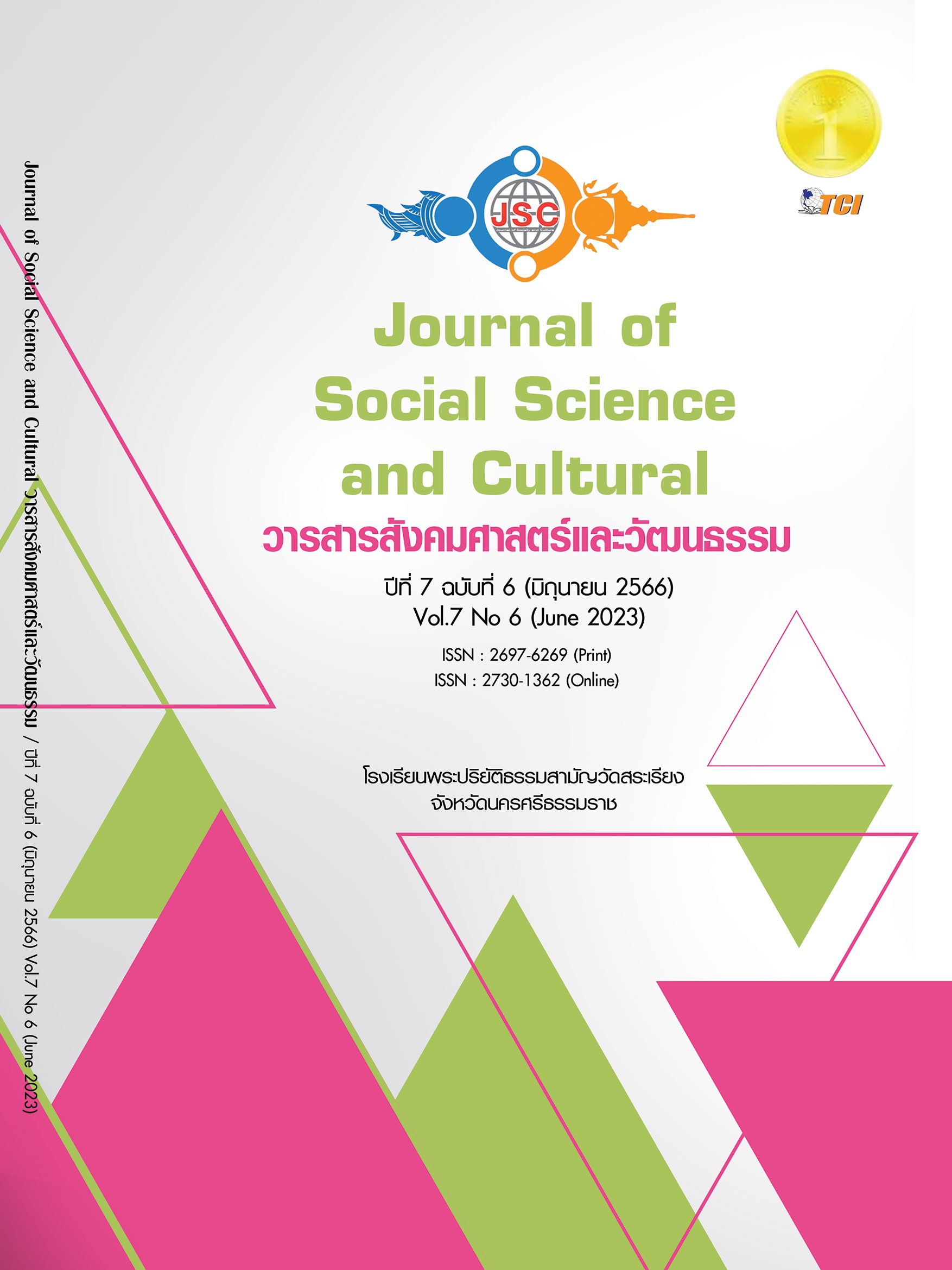TEACHING AND LEARNING MANAGEMENT MODEL OF BUDDHIST RELIGIOUS EDUCATION
Main Article Content
Abstract
The objectives of this research article were three-fold: 1) to study the content of the Buddhist Studies curriculum, 2) to investigate the problems of the Buddhist Studies curriculum, and 3) to present a model for teaching Buddhist Studies. This research utilized a qualitative field research methodology. Key informants for this research included 18 experts in teaching Buddhist Studies and 9 people in specific group discussions. The research tools included an interview form. Data were analyzed using content analysis within context. The results of the research revealed that: 1) The content of the Buddhist Studies curriculum, when compared to other subjects, showed that the morality and ethics content had the most indicators, leading to a high volume of content in the Buddhist Studies subject curriculum at various educational institutions. Some principles in the curriculum were complex, and some content was repeated across different grade levels; 2) The main problems with the Buddhist Studies curriculum were that the content was difficult and required a lot of memorization. Teachers had to spend a lot of time preparing lessons, often resorting to lecture-based teaching methods, which most students didn’t enjoy. Thus, Buddhist Studies became a subject that students found boring; 3) The suggested teaching model for Buddhist Studies should emphasize practical application in daily life, active learning. proposed teaching model for Buddhist Studies is the WCICC MODEL, which the researcher developed using the teaching techniques or parables of the Buddha.
Article Details
References
กรมวิชาการ กระทรวงศึกษาธิการ. (2544). การบูรณาการข้ามวิชา. กรุงเทพมหานคร: คุรุสภาลาดพร้าว.
กระทรวงศึกษาธิการ. (2551). หลักสูตรแกนกลางการศึกษาขั้นพื้นฐานพุทธศักราช 2551. กรุงเทพมหานคร: กระทรวงศึกษาธิการ.
ขวัญฟ้า รังสิยานนท์. (2552). การพัฒนารูปแบบการจัดกระบวนการเรียนรู้แนวพุทธสำหรับเด็กปฐมวัย. ใน ดุษฎีนิพนธ์ปรัชญาดุษฎีบัณฑิต สาขาวิชาสังคมวิทยา. มหาวิทยาลัยรามคำแหง.
ดารารัตน์ อุทัยพยัคฆ์. (2548). การพัฒนารูปแบบการเรียนการสอนแบบพุทธวิธีเพื่อเสริมสร้างพฤติกรรมการอนุรักษ์สิ่งแวดล้อมของเด็กปฐมวัย. ใน ดุษฎีนิพนธ์ปรัชญาดุษฎีบัณฑิต สาขาวิชาการศึกษาปฐมวัย. มหาวิทยาลัยศรีนครินทรวิโรฒ.
ทิศนา แขมมณี. (2550). รูปแบบการเรียนการสอนทางเลือกที่หลากหลาย. กรุงเทพมหานคร: จุฬาลงกรณ์มหาวิทยาลัย.
บดินท์ ธรรมสังวาล. (2553). การพัฒนาตัวบ่งชี้คุณภาพโรงเรียนวิถีพุทธ. ใน ดุษฎีนิพนธ์ปรัชญาดุษฎีบัณฑิต สาขาวิชาวิจัยและพัฒนาหลักสูตร. มหาวิทยาลัยศรีนครินทรวิโรฒ.
พระธรรมปิฎก (ป.อ.ปยุตฺโต). (2513). พุทธวิธีในการสอน. กรุงเทพมหานคร: มูลนิธิพุทธธรรม.
พระธรรมปิฎก (ป.อ.ปยุตฺโต). (2541). การศึกษาเครื่องมือพัฒนาที่ยังต้องพัฒนา. กรุงเทพมหานคร: มูลนิธิพุทธธรรม.
พุทธทาสภิกขุ. (2546). การศึกษากับศีลธรรม. กรุงเทพมหานคร: สุขภาพใจ.
วิจารณ์ พานิช. (2556). สอนนอกกรอบ:ยุทธวิธีจับใจศิษย์. กรุงเทพมหานคร: สหมิตรพริ้มติ้งแอนด์พับลิสซิ่ง.
สำนักงานรับรองมาตรฐานและประเมินคุณภาพการศึกษา (องค์การมหาชน). (2547). รวมกฎหมายการศึกษา เล่ม 7. กรุงเทพมหานคร: โรงพิมพ์แห่งจุฬาลงกรณมหาวิทยาลัย.
สิริวรรณ ศรีพหล. (2553). การจัดการเรียนการสอนกลุ่มสาระการเรียนรู้สังคมศึกษา ศาสนาและวัฒนธรรม. นนทบุรี: โรงพิมพ์มหาวิทยาลัยสุโขทัยธรรมาธิราช.
สิริวรรณ ศรีพหล. (2554). การจัดการเรียนรู้วิชาสังคมศึกษา. ใน เอกสารประกอบการสอนรายวิชา 472 552 สัมมนาหลักสูตรและการสอนสังคมศึกษา ภาควิชาหลักสูตรและวิธีสอนคณะศึกษาศาสตร์. มหาวิทยาลัยศิลปากร.
สุมน อมรวิวัฒน์. (2533). สมบัติทิพย์ของการศึกษาไทย. กรุงเทพมหานคร: จุฬาลงกรณ์มหาวิทยาลัย.


